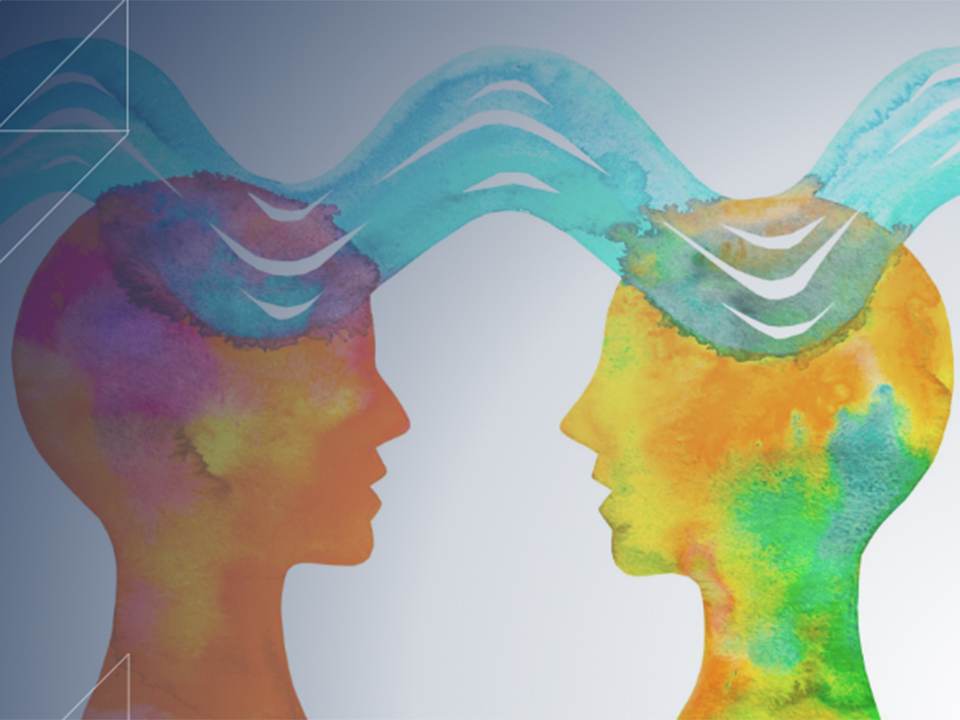Cameron’s new consortium focusing on ethical decisions, empathy
by Eliana Hadjiandreou
Rock Ethics Institute (REI) senior research associate Daryl Cameron has launched the Consortium on Moral Decision-Making.
The goal is to create an interdisciplinary, collaborative network of social scientists and scholars studying how people make moral and ethical decisions, with an emphasis on empathy, said Cameron, REI Sherwin Early Career Professor and associate professor in psychology.
 “Scrolling through the news recently, one is met with seemingly endless possibilities to empathize with the pain and suffering of others. This is what the consortium is all about, bringing moral decision-making of what we see in everyday life into focus”, Cameron said. The ongoing wars in Ukraine and Gaza, the fires in Hawaii, the earthquake in Morocco, are only some of hundreds of examples.
“Scrolling through the news recently, one is met with seemingly endless possibilities to empathize with the pain and suffering of others. This is what the consortium is all about, bringing moral decision-making of what we see in everyday life into focus”, Cameron said. The ongoing wars in Ukraine and Gaza, the fires in Hawaii, the earthquake in Morocco, are only some of hundreds of examples.
Cameron’s research attempts to understand why people do or don’t feel empathy and compassion for people who are in need, in contexts spanning from political conflicts to large-scale crises, as well as the psychological factors involved in moral emotions more broadly. The essence of the Consortium on Moral Decision-Making is understanding the ethics of these everyday events as they relate to morality and has been partially inspired by Cameron’s work on empathy.
Cameron’s research has used samples ranging from voters in prominent elections in order to understand the dynamics of compassion among political opponents, to physicians caring for patients in order to study potential empathy “burnout,” to patients with damage to the part of the brain that impacts moral decisions. He has also ventured into questions of applied ethics that are relevant in our era such as empathy for animals, and empathy for artificial intelligence agents and humanoid robots.
Across all these contexts, one central question is guiding Cameron’s research: Why does one person show empathy in one case, but not another?
Cameron says that there are several motivations that could determine this empathic (or lack thereof) reaction. His job as an empathy researcher, as he defines it, is to better identify, understand and map the limits of those motivations. As he notes, the answers are sometimes expected, other times surprising and more often than not, incomplete until further inspection, as it often happens in academic research. He did, however, share a few examples from his published and ongoing projects.
Some of Cameron’s recent work with current graduate student Stephen Anderson and assistant professor of psychology and director of the Cognitive Neuroscience of Creativity Laboratory at Penn State, Roger Beaty, sheds light on one motivation for empathy: creativity.
In one of their studies, Cameron, Anderson and Beaty assigned participants to be either empathetic or objective towards others, and subsequently measured their creativity. Participants demonstrated greater creativity following the empathy option, indicating that empathy and creativity might be sharing common ground as mental processes.
This, in turn, poses new, exciting questions: Does creativity facilitate empathic accuracy (by creating new possibilities for how one could feel) or hinder empathic accuracy (by making it harder to guess the “right” answer)?
In other work with Anderson, Cameron finds that when people read about immoral behavior they want to share in and imagine the experience of the immoral actor, but only if the self is described to be dissimilar to that immoral actor. When participants are encouraged to reflect on similarities between themselves and an immoral actor, they avoid feeling empathy for the actor.
This suggests that it is not enough to consider whether a behavior is good or bad, to determine if empathy for the situation or the wrongdoer unfolds in the real world. Nor is it enough to know whether one feels similar to another. Instead, what these findings suggest is that the combination of the two is important, since we also need to know that our self is “distant” enough from wrongdoing to feel psychologically safe to share in an experience.
Such nuances can also be found in Cameron’s work with former graduate student and current post-doctoral fellow at UC Berkley, Julian Scheffer. Scheffer and Cameron, collaborated with Michael Inzlicht, professor of psychology and management at the University of Toronto, to show that compassion (feeling concern for another) can be mentally taxing and people can feel motivations to avoid it when they have another available option, but this is less the case when others are loved ones.
In those cases, people are glad to put in the hard work that it takes to feel concern for the ones they care about, in which case the alternative course of action seems less attractive, by comparison. Scheffer will continue this line of research as an incoming assistant professor of psychology at the University of Western Ontario.
What about non-human targets of empathy? Using the design described above, Cameron and his collaborators again pitted empathy against an alternative course of action, this time for animals.
For this study, Cameron teamed with Janet Swim, professor of psychology and affiliated researcher at Penn State’s Institute of Energy and the Environment, Michael Lengieza, a former Penn State graduate student and now a lecturer at Durham University in the United Kingdom, and current Penn State psychology graduate student Joseph Guerriero.
They found that empathy for combined stereotypes of animals with both high competence and high warmth (e.g., cats, elephants, horses) significantly outnumbered empathy for animals that were low in either competence (e.g., cows, hamsters, rabbits) or warmth (e.g., bears, leopards, tigers), or low in both (e.g., chickens, lizards, snakes).
To summarize, Cameron’s research and the vision he is bringing to the Consortium on Moral Decision-Making has already identified motivations that are relevant to empathy such as creativity, felt similarity, the nature of the act we are empathizing with, as well as who it is we are empathizing with, and the stereotypes we have for them.
When asked whether, in an ideal scenario, we could we create a world in which we would reverse-engineer these motivations in order to increase empathy in the world, Cameron referenced the concern that some have about an “empathy deficit” in society — the idea that the world is not as empathetic or compassionate as it used to be and that we need to do something about it. Of course, if we take this concern seriously, this reverse-engineering must take place immediately. “Unless empathy is not as diminishing as we have assumed it is,” Cameron said.
Recent published work from other researchers, but also some of Cameron’s ongoing work with current graduate student Eliana Hadjiandreou, suggests that people think other’s empathy and compassion is lacking, when that might not accurately reflect reality.
In this work, Hadjiandreou and Cameron, alongside their collaborator Charlie Crimston, lecturer at the Australian National University in Canberra, Australia, asked participants to place entities within the moral boundary, mapping their “moral world.” Then, they asked participants to do the same for other people’s moral worlds.
They found that participants thought others had more constricted moral circles than themselves, which presents a mathematical impossibility: Not everyone can be more morally inclusive than others. This might suggest a perception issue with how we view empathy and compassion. Are we really in an “empathy deficit” as some have suggested, or is it just our assumption that we are?
Cameron’s reaction to the “empathy deficit” claim is precisely at the heart of Penn State’s Rock Ethics Institute commitment to examine the ethical underpinnings of academic knowledge: It’s complicated.
Outside of what our personal beliefs are, sometimes empathy can be problematic, and over-empathizing can be a bad thing. “For example, some studies have linked compassion to political polarization,” Cameron said. Or, in the medical context, several studies show that too much empathy might lead doctors and nurses to burnout. Thus, while personal belief is hard to separate from what we study, as psychologist and philosopher William James said, it’s important to scientifically question our assumptions about favoring or disfavoring empathy.
Cameron is, of course, partial to the construct that he studies. He thinks empathy is a useful tool in our lives, and more of it is better than less in most contexts. However, beyond the personal, he recognizes that empathy, like many psychological processes, such as anger and fear, cannot universally be deemed bad or good; rather, to use a cliché, it depends on the situation.
“Part of our jobs as psychologists,” Cameron said, “is to precisely understand when empathy is a useful tool, ethically speaking, and when it might lead us astray”.
Since the world is increasingly complex, and empathy can unfold in a variety of contexts, one of the ways to better tackle such questions is to have interdisciplinary conversations between different scholars. Cameron has worked with political scientists, environmental psychologists, animal advocates, rural sociologists, aerospace engineers and others in an attempt to look at empathy from different angles, and for different purposes. This, he says, will be the primary climate at the Consortium on Moral Decision-Making as well.
Cameron has tried to ensure that this work remains accessible to the public. He has invited both psychologist and philosopher scholars on campus (or virtually) as part of the Expanding Empathy Speaker Series hosted by the Rock Ethics Institute, and has been spearheading the initiative ever since.
Entering its six consecutive year, the Expanding Empathy talks are free and open to the public. Cameron has recorded these along with personalized interviews with each scholar, which are posted on the Rock Ethics YouTube channel, available to all. Some examples from the series include panels on Empathy for Animals from the 2023 series, on Empathy, Outrage, and Online emotion from the 2022 series and Humans and Machines on empathy in the robot age, from the 2021 series.
The questions, however, remain: Should empathy be a guiding moral force in our lives, and what is the best way to answer this question? If empathy is a guiding force for much of the good we see in the world today, but also partially responsible for some of the bad, should it be a guiding force for our lives, ethically speaking? “This is a question that might well remain unanswered for many more years to come, and as such, my job as a moral psychologist who studies empathy will never really be deemed ‘complete.’”
In most sciences, the answer to when a researcher’s job is complete is “never.” However, the Consortium on Moral Decision-Making aims to make collaborative strides towards the understanding of empathy, compassion and morality as the initiative is pushed forward over the next several years. Joint lab meetings between Cameron’s lab and the Morality and Social Cognition Lab directed by assistant professor in psychology, Sean Laurent, are already taking place to combine efforts to study morality. And Cameron says the new graduate students who have joined his lab this year — Faruk Yalcin, Alana Harris, and Josh Wenger — will be key in developing and testing new ideas. Many more scholars from within and outside of Penn State have already joined the initial consortium meetings.
Cameron notes that’s it’s an exciting time to be doing work in moral psychology at Penn State. Caveats to research on empathy are continually added, and we get a better understanding of which answers are more likely than others, Cameron says. Many of these questions have been asked by philosophers and theologists for millennia, and while the Consortium on Moral Decision-Making will provide a fertile ground to explore them in an interdisciplinary environment, Cameron says must have the humility to understand that some of them might, nevertheless, remain unanswered.
We can only hope to understand such vast a phenomenon as empathy only a tiny bit better in our lifetimes.
